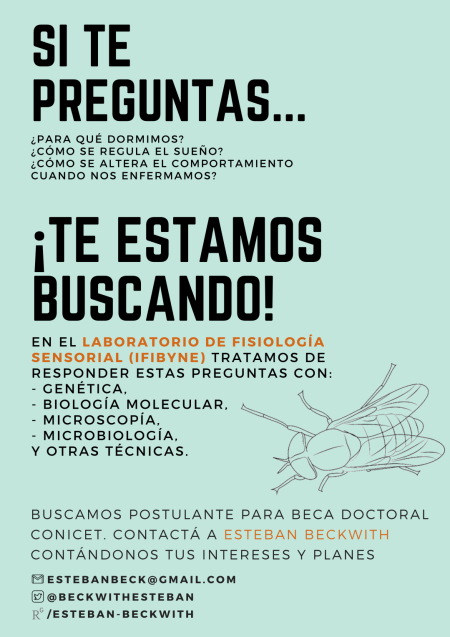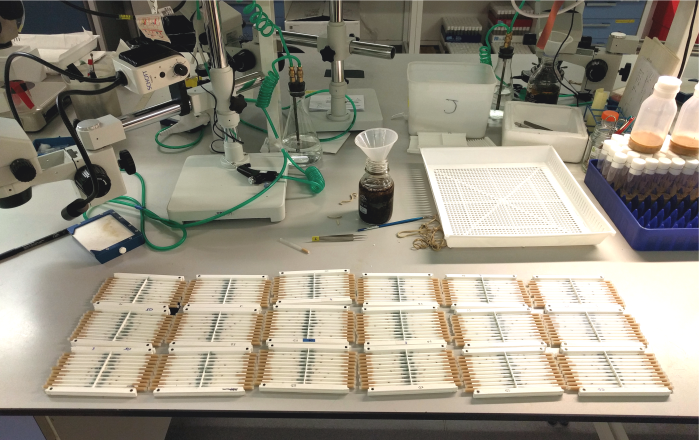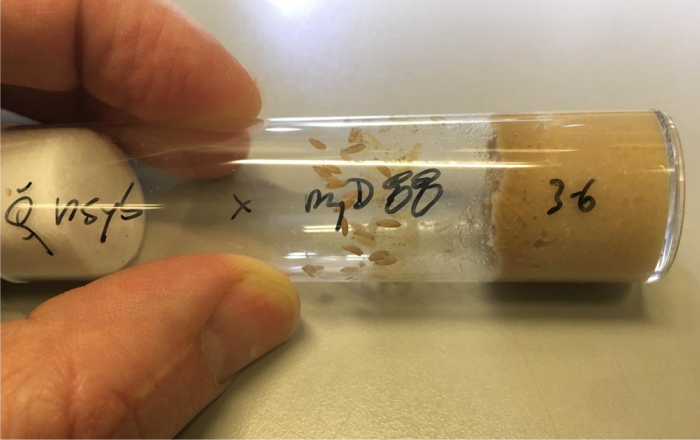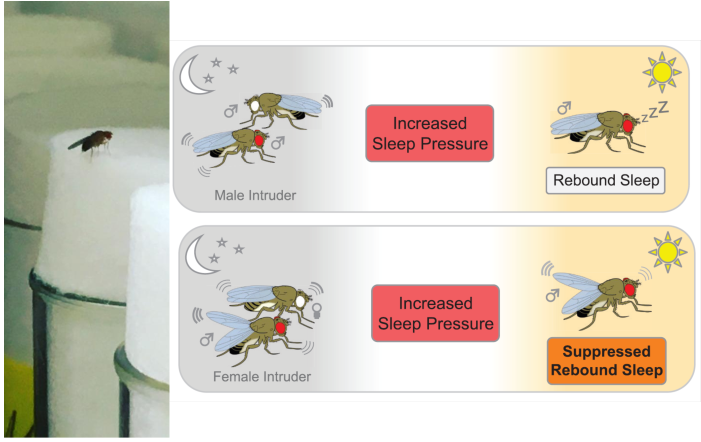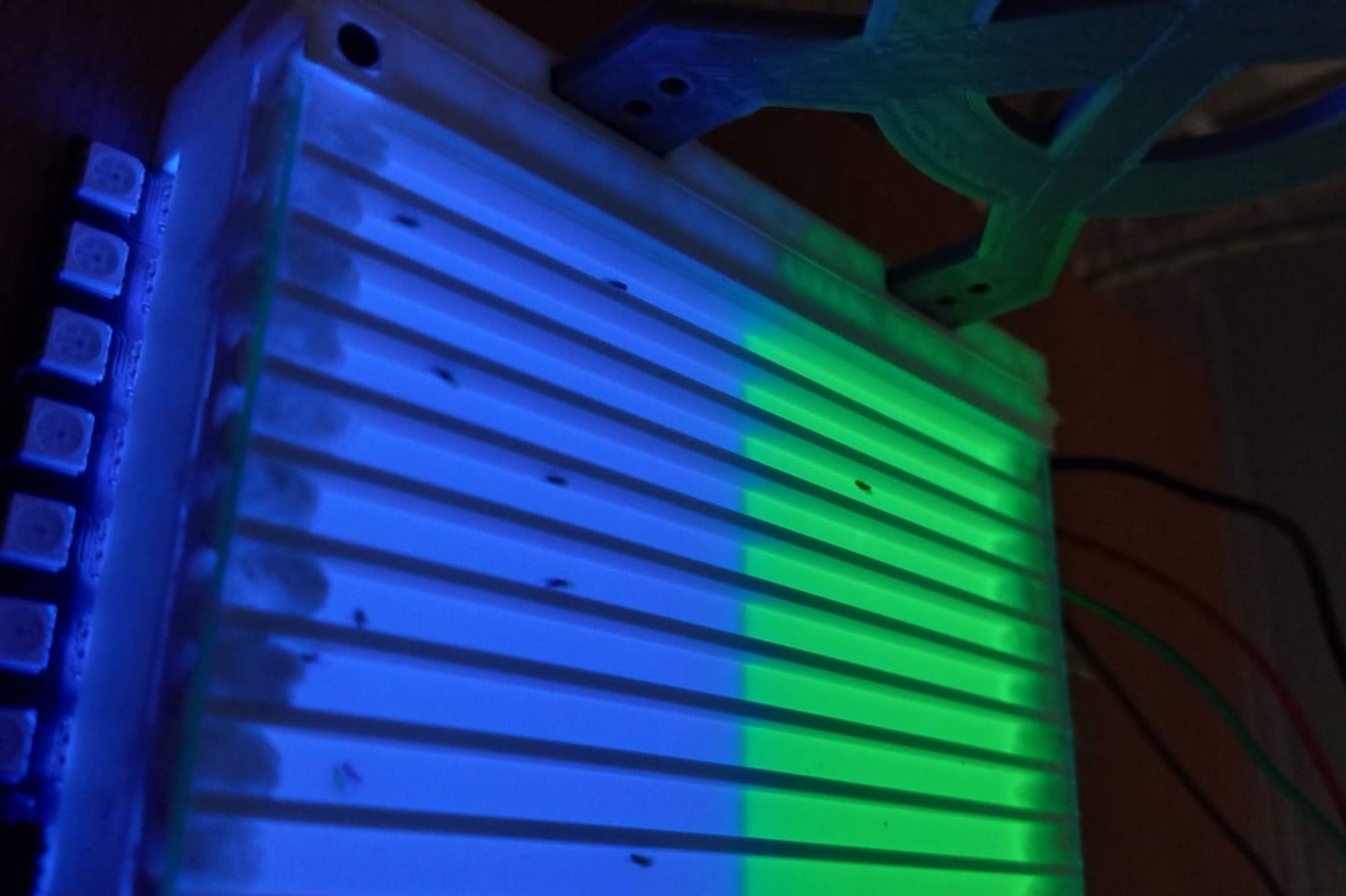En el laboratorio llevamos adelante líneas de trabajo que se centran en entender cuál es la función del sueño, y cómo se regula, tanto en condiciones normales como situaciones patológicas, como ser infecciones bacterianas o en un modelo de cancer intestinal. Hoy existen cuatro líneas de trabajo que estamos explorando:
In the laboratory, we carry out lines of work that focus on understanding the function of sleep, and how it is regulated, both in normal conditions and in pathological situations, such as bacterial infections or a model of intestinal cancer. Today there are four lines of work that we are exploring:
Research avenues:
La función del sueño desvela a la humanidad desde tiempos inmemoriales. Hoy sabemos algunas cosas sobre para qué dormimos, o cuáles son los efectos beneficiosos de un buen descanso. Pero queda mucho por descubrir. Utilizando un equipo que permite medir e interrumpir el sueño nos proponemos inducir privaciones de sueño agudas y crónicas, para luego estudiar cómo esto afecta la función del sistema inmune innato.
Role of sleep in the functioning of the innate immune system
Sleep function intrigues humanity since immemorial times. Today we know some things about what we sleep for, and which are the benefits of good rest. However, much remains to be discovered. Using a specially developed equipment that allows us to measure and impair sleep, we propose to induce acute and chronic sleep deprivation, to then study how these treatments affect the function of the innate immune system.
Desde un punto de vista clásico, el sueño se regula por el reloj circadiano y por el homeostato del sueño, que nos indica hace cuanto que estamos despiertos. Sin embargo, mucha evidencia indica que hay otros reguladores muy potentes, entre ellos las interacciones sociales. Nos proponemos adaptar nuestra plataforma de registro de sueño para poder evaluar este comportamiento en grupos de animales y estudiar como el contexto social, el tipo y cantidad de interacciones o el aislamiento impactan en este comportamiento.
Social interactions as a sleep regulator
From a classical point of view, sleep is regulated by the circadian clock and the sleep homeostat. However, mounting evidence indicates that there are other very powerful regulators, among which social interactions stand out. We propose to adapt our sleep recording platform to be able to evaluate this behaviour in groups of flies and study how the social context, the type and quantity of the interactions or isolation influences this behaviour.
Así como proponemos que el sueño tiene un impacto sobre el funcionamiento del sistema inmune innato, también sabemos que la activación del sistema inmune innato mediada por algunas infecciones bacterianas produce un cambio en el perfil de actividad y reposo de las moscas (y muchos otros animales!). Conocemos qué vías de señalización son necesarias para este cambio comportamental y queremos investigar dónde estas vías son necesarias, cómo fluye la información desde que se detecta la infección hasta el cambio comportamental y cuáles son los centros neuronales y los genes que intervienen en este proceso.
The effect of bacterial infection on behaviour.
The relationship between sleep and immunity is bidirectional. In this context, we know that the activation of the innate immune system, mediated by some bacterial infections, produces a change in the activity and resting profiles of many animals. Previous results of our lab showed which signalling pathways are necessary for this behavioural change, and we want to investigate where these pathways are necessary, how information flows from the infection-detection to the behavioural change, and which are the neuronal centres and genes that intervene in this process.
La regulación del sueño es un tema de acuciante impacto social con una creciente preocupación médica y social, ya que está asociado a un gran número de enfermedades agudas y crónicas. En particular, las enfermedades del intestino y otros órganos periféricos suelen estar acompañadas de cambios en el comportamiento que, en el caso de enfermedades crónicas, pueden tener graves consecuencias para el cuerpo y la mente. La inflamación crónica y el cáncer están asociadas con trastornos alimenticios, fatiga y, en particular, con la disfunción del sueño. Sin embargo, poco se sabe sobre los mecanismos por los cuales estas enfermedades intestinales impactan estos comportamientos.
Establecimos en el laboratorio un modelo de cancer intestinal en Drosophila y estamos investigado como esto impacta el sueño y como la manipulacion del sueño modula la progresión tumoral.
Bidirectional regulation between sleep and intestinal physiology
Sleep regulation is a topic of pressing social impact with growing medical and social concern, as it is associated with a large number of acute and chronic diseases. In particular, diseases of the gut and other peripheral organs are often accompanied by behavioral changes that, in the case of chronic diseases, can have serious consequences for the body and mind. Chronic inflammation and cancer are associated with eating disorders, fatigue, and, in particular, sleep dysfunction. However, little is known about the mechanisms by which these gut diseases impact these behaviors.
We established a model of intestinal cancer in Drosophila in the laboratory and are investigating how this impacts sleep and how sleep manipulation modulates tumor progression.
In total, I have published 22 scientific articles. In eleven of these articles, I am the first author, and I am the corresponding author in four.
22- “Socialization causes long-lasting behavioral changes” Beatriz Gil-Martí, Julia Isidro-Mézcua, Adriana Poza-Rodriguez, Gerson S. Asti Tello, Gaia Treves, Abhijit Das, Enrique Turiégano, Esteban J. Beckwith* & Francisco A Martin*. bioRxiv 2024. doi: https://doi.org/10.1101/2024.04.25.591071
*Corresponding authors
21- “Social information as an entrainment cue for the circadian clock” Chiara Costa Petrillo, Nicolás Pírez & Esteban J. Beckwith*. Genetics and Molecular Biology, May 2024 in press. Literature review.
*Corresponding author
20- “A REM-active basal ganglia circuit that regulates anxiety” Wei Ba, Mathieu Nollet, Xiao Yu, Sara Wong, Andawei Miao, Esteban J Beckwith, Edward C Harding, Ying Ma, Raquel Yustos, Alexei Vyssotski, William C Wisden & Nicholas P Franks. Current Biology, May 2024 in press.
19- “A serine-folate metabolic unit controls resistance and tolerance of infection” Krista Grimes*, Esteban J Beckwith*, William H Pearson, Jake Jacobson, Surabhi Chaudhari, Gabriel N Aughey, Gerald Larrouy-Maumus, Tony D Southall & Marc S Dionne. bioRxiv. 2022 doi: https://doi.org/10.1101/2022.11.25.517956
*Equal contribution.
18- “Infection increases activity via Toll dependent and independent mechanisms in Drosophila melanogaster” Crystal M Vincent*, Esteban J Beckwith*, Carolina J Simoes da Silva, William H Pearson, Katrin Kierdorf, Giorgio F Gilestro, Marc S Dionne. PLoS Pathog. 2022 Sep 21;18(9):e1010826. doi: 10.1371/journal.ppat.1010826. eCollection 2022 Sep.
*Equal contribution.
17- “Pre-copulatory reproductive behaviours are preserved in Drosophila melanogaster infected with bacteria”. Saloni Rose, Esteban J Beckwith, Charlotte Burmester, Robin C May, Marc S Dionne and Carolina Rezaval. Proc Biol Sci. 2022 DOI: 10.1098/rspb.2022.0492.
16- “Sensory processing during sleep in Drosophila melanogaster”. French AS, Geissmann Q, Beckwith EJ, Gilestro GF. Nature. 2021 DOI: 10.1038/s41586-021-03954-w.
15- “Sleep in Drosophila and Its Context”. Esteban J. Beckwith* and Alice S. French. Frontiers in Physiology. 2019. DOI: 10.3389/fphys.2019.01167. Literature review.
*Corresponding author
14- “Most sleep does not serve a vital function. Evidence from Drosophila melanogaster” Quentin Geissmann*, Esteban J. Beckwith* and Giorgio F. Gilestro. Science Advances. 2019. DOI: 10.1126/sciadv.aau9253.
*Equal contribution
13- “Rethomics: an R framework to analyse high-throughput behavioural data”. Quentin Geissmann, Luis Garcia Rodriguez, Esteban J. Beckwith and Giorgio F. Gilestro. PLoS One. 2019. DOI: 10.1371/journal.pone.0209331.
12- “Ethoscopes: an open platform for high-throughput ethomics”. Quentin Geissmann, Luis Garcia Rodriguez, Esteban J. Beckwith, Alice S. French, Arian R. Jamasb and Giorgio F. Gilestro. PloS Biol. 2017. DOI: 10.1371/journal.pbio.2003026.
11- “Regulation of sleep homeostasis by sexual arousal”. Esteban J. Beckwith, Quentin Geissmann, Alice S. French and Giorgio F. Gilestro. eLife. 2017. DOI: 10.7554/eLife.27445.
10- “Rhythmic behavior is controlled by the SRm160 splicing factor in Drosophila melanogaster”. Esteban J. Beckwith, Carlos E. Hernando, Sofía Polcowñuk, Agustina P. Bertolin, Estefania Mancini, M. Fernanda Ceriani and Marcelo J. Yanovsky. Genetics. 2017.
DOI: 10.1534/genetics.117.300139.
9- “Communication between circadian clusters: The key to a plastic network”. Esteban J. Beckwith* and M. Fernanda Ceriani*. FEBS letters. 2015. DOI: 10.1016/j.febslet.2015.08.017. *Co-corresponding authors. Literature review.
8- “Experimental assessment of the network properties of the Drosophila circadian clock”. Esteban J. Beckwith, and M. Fernanda Ceriani. Journal of Comparative Neurology. 2015. DOI: 10.1002/cne.23728.
7- “Circadian regulation of gene expression: at the crossroads of transcriptional and post-transcriptional regulatory networks”. Esteban J. Beckwith and Marcelo J. Yanovsky. Current opinion in genetics & development. 2014. DOI: 10.1016/j.gde.2014.03.007. Literature review.
6- “Circadian period integrates network information through activation of the BMP signaling pathway”. Esteban J. Beckwith, E. Axel Gorostiza, Jimena Berni, Carolina Rezával, Agustín Pérez-Santángelo, Alejandro D. Nadra and M. Fernanda Ceriani. PloS Biol. 2013.
DOI: 10.1371/journal.pbio.1001733.
5- “Functional Conservation of Clock Output Signaling between Flies and Intertidal Crabs”. Esteban J. Beckwith, Katherine R. Lelito, Yun-Wei A. Hsu, Billie M. Medina, Orie Shafer, M. Fernanda Ceriani and Horacio O. de la Iglesia. Journal of Biological Rhythms. 2011.
DOI: 10.1177/0748730411420242.
4- “Adult-specific electrical silencing of pacemaker neurons uncouples the molecular oscillator from circadian outputs”. Ana Depetris-Chauvin1, Jimena Berni, Ezequiel J. Aranovich, Nara I. Muraro, Esteban J. Beckwith, and M. Fernanda Ceriani. Current Biology. 2011.
DOI: 10.1016/j.cub.2011.09.027.
3- “A methyl transferase links the circadian clock to the regulation of transcription and alternative splicing”. Sabrina E. Sanchez*, Ezequiel Petrillo*, Esteban J. Beckwith, Xu Zhang, Matias L. Rugnone, C. Esteban Hernando, Juan C. Cuevas, Micaela A. Godoy Herz, Ana Depetris-Chauvin, Craig G. Simpson, John W. S. Brown, Pablo D. Cerdán, Justin O. Borevitz, Paloma Mas, M. Fernanda Ceriani, Alberto R. Kornblihtt and Marcelo J. Yanovsky. Nature. 2010.
DOI: 10.1038/nature09470. *Equal contribution.
2- “A functional misexpression screen uncovers a role for enabled in progressive neurodegeneration”. Carolina Rezával, Jimena Berni, E. Axel Gorostiza, Santiago Werbajh, M. Marta Fagilde, María Paz Fernández, Esteban J. Beckwith, E. Aranovich, Carmen Sabio y García and M. Fernanda Ceriani. PLoS One. 2008. DOI: 10.1371/journal.pone.0003332.
1- “The axon-guidance roundabout gene alters the pace of the Drosophila circadian clock”. Jimena Berni, Esteban J. Beckwith, María Paz Fernandez and M. Fernanda Ceriani. European Journal of Neuroscience. 2008. DOI: 10.1111/j.1460-9568.2007.06010.x.
INVITED SPEAKER AT CONFERENCES AND SEMINARS (LAST YEARS)
2023
– Symposium speaker at XXXVIII Annual meeting of the Argentinean Society for Neuroscience.
2022
– Invited lecturer at “Seminarios de actualización en neurociencia” (DFBMC-FCEN-UBA).
2021
– Symposium speaker at XVI Latin American Symposium Of Chronobiology – LASC2021.
2020
– Symposium speaker at Insects Infection & Immunity meeting, organized by The Royal Entomological Society.
– On line seminar at Departamento Física Médica, Centro Atómico Bariloche, Argentina. Invited by Dr. Lorena Franco
2019
– Faculty of Natural Science seminar, Imperial College London, UK. Invited by the Dean, Professor Tom Welton.
2018
– Seminar at University of Würzburg. Invited by Professor Dr. Charlotte Förster, Chair of Neurobiology and Genetics. Biocenter of the University of Würzburg, Germany.
– Seminar at University of Sussex. Invited by Professor Claudio Alonso, Sussex Neuroscience, School of Life Sciences, University of Sussex, Brighton, UK.
– Seminar at Instituto de Biología Celular y Neurociencias, Facultad de Medicina, Universidad de Buenos Aires, Argentine.
– Seminar at Departamento de Fisiología, Biología Molecular y Celular, Facultad de Ciencias Exactas y Naturales, Universidad de Buenos Aires, Argentine.
– Seminar at Instituto de Investigación en Biomedicina de Buenos (IBioBA), Argentine.
– Seminar at Fundación Instituto Leoir, Buenos Aires, Argentine.
2017
– Seminar at Bristol University. Invited by Dr. James Hodge, Senior Lecturer, School of Physiology, Pharmacology and Neuroscience, University of Bristol, Bristol, UK.
2016
– 16th European Neurobiology of Drosophila Conference, Crete, Greece.
– Department of Life Science Postdoc Symposium, Imperial College London, London, UK.
POSTER PRESENTATIONS (LAST 5 YEARS)
2022
The laboratory participated in the Argentinean Society for Neuroscience (SAN) with two poster presentations:
– “Role of the memory system in the behavioural change induced by social isolation in Drosophila melanogaster”. Gerson Asti Tello, Beatriz Gil Marti, Francisco Martin, Esteban J. Beckwith
– “Social interactions synchronize the phase of circadian locomotor activity of the fruit fly Drosophila melanogaster” Chiara Costa, Marcos Sorrentino, Esteban J Beckwith and Nicolás Pírez
2019
– Integrated insect immunology: controlling infections, hosted by conferences Jacques Monod, CNRS, France.
2018
– Sleep and Circadian Rhythms from Mechanisms to Function, London, UK. Organized by The Physiological Society.
– 17th European Neurobiology of Drosophila Conference, Krakow, Poland.
– 24th Congress of the European Sleep Research Society (ESRS), Basel, Switzerland.
2017
– Neurobiology of Drosophila, Cold Spring Harbor Laboratory, USA.
– EMBO Fellows’ Meeting, Heidelberg, Germany.
– European Drosophila Research Conference, London, UK.
TEACHING AND MENTORING
Supervision
– Director tesis de Licenciatura en Biología, FCEN-UBA, en curso. Estudiante: Gerson Asti.
– Imperial College London master students. I mentored seven successful and talented students. All of them graduated with excellent marks.
– Imperial College London undergrad students. I mentored two successful students. Both of them graduated with excellent marks.
Teaching
2012-2014: Postgraduate teaching assistant on the undergraduate course “Introduction to Molecular Physiology”, School of Sciences, University of Buenos Aires.
2010 Laboratory Instructor, 2nd IBRO-ISN Advanced School of Neuroethology. Buenos Aires, Argentina. 5 students spent 1 week in the lab to carry out a project.
2005-2006: Undergraduate teaching assistant on the undergraduate courses “Genetics I” and “Introduction to Molecular and Cellular Biology”, School of Sciences, University of Buenos Aires.
2006: Design and implementation of the practical work “Genetics of Drosophila” for the undergraduate course “Genetics I”, School of Sciences, University of Buenos Aires.6
GRANTS, PRIZES AND AWARDS
2023
– PICT-2022-03-00189: “Estudio de la regulación molecular de los ritmos circadianos en Drosophila melanogaster” (“Study of the molecular regulation of circadian rhythms in Drosophila melanogaster”). Rol: Investigador Responsable.
– PICT-2022-09-00412: “Estudio funcional y mecanístico de la plasticidad sensorial en olfato” (“Functional and mechanistic study of sensory plasticity in olfaction”). Rol: Miembro del Grupo Responsable, IR: Fernando Locatelli.
2022
– CONICET (PIBAA) 2022-2023: “Caracterización de los circuitos neuronales que balancean los comportamientos de cortejo y sueño en Drosophila melanogaster” (“Characterization of the neural circuits that balance courtship and sleep behaviors in Drosophila melanogaster”). Rol: Investigador Responsable.
– PICT-2020-SERIEA-01240: “Estudio de los cambios conductuales inducidos por la activación del sistema inmune innato” (“Study of behavioral changes induced by activation of the innate immune system”). 665,000.00 Pesos Argentinos. Rol: Investigador Responsable.
2021
– PICT-PRH- 2021-00009 denominado “Rol del sueño en la función del sistema inmune innato” (“Role of sleep in the function of the innate immune system”). RESOL-2021-204-APN. Rol: Investigador Responsable.
– Proyectos de Investigación Plurianuales (PIP) – CONICET. “El contexto social y su rol como modulador del comportamiento animal” (“The social context and its role as a modulator of animal behavior”). Rol: Investigador Responsable.
– Return Home Grant. Programa RAICES. Minister of Science, Technology, and Innovation, Argentina.
2020
– IBRO Return Home Fellowship. Award of €20,000.
– Department of Life Sciences Postdoc Proof of Concept Fund award. Project title: “Improving cognitive functions by extending sleep”. Internal competition within this department of the Imperial College London. The award was shared with Dr. Ba Wei and consists of £2,000.
2016
Marie Skłodowska-Curie Individual Fellowships. The total budget of the grant is €183,454.80. The success rate of the call was 14,20%.
2015
EMBO Long-Term Fellowship. The total amount of the grant was £57,020.54 and only covered my salary. The success rate of this application was 15%.
2014
Argentine National Council for Scientific and Technical Research (CONICET), 2 years fellowship (salary).
2012
– IBRO Travel Grant. A $1,000 US dollars prize to attend the I FALAN meeting in Cancún, México.
– Premio Fundación Bunge & Born. 2 years fellowship (salary)
2010
Travel Grants/Short Stays- IBRO LARC. A grant of €1,200 to cover a 2-month traineeship at Dalhousie University, Halifax, Canada.
2007
– Argentine National Council for Scientific and Technical Research (CONICET), a 5 years fellowship for graduate research (salary).
– International Brain Research Organization. A fellowship to assist to the Advance School of Neuroscience in Argentina: Neuroethology.
Integrantes del grupo

Lic Analía Ferreyra
Estudiante de Doctorado

Lic Analía Ferreyra
Estudiante de Doctorado
- Phone:+549 (11) 2546-6589
- Email:info@example.com

Chiara Costa Petrillo
Estudiante de Licenciatura

Chiara Costa Petrillo
Estudiante de Licenciatura
- Phone:+549 (11) 2546-6589
- Email:info@example.com

Luna Ripari
Estudiante de Licenciatura

Luna Ripari
Estudiante de Licenciatura
- Phone:+549 (11) 2546-6589
- Email:info@example.com
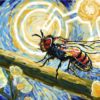
Empleade del año
(arte: Nina Lorenzo)

Empleade del año
(arte: Nina Lorenzo)
- Phone:+549 (11) 2546-6589
- Email:info@example.com
Postulante para Beca Doctoral
